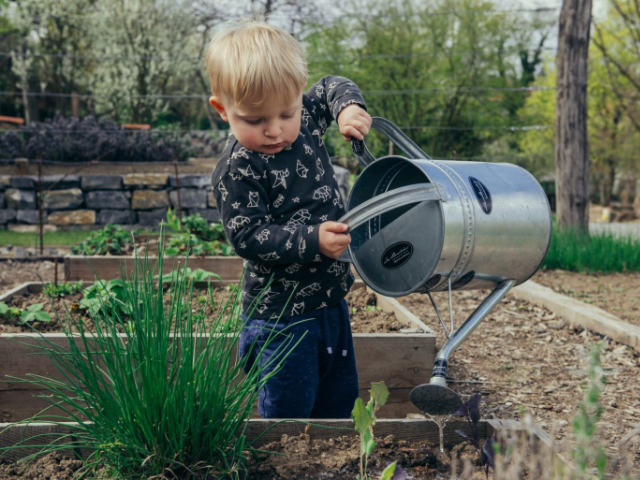Kids gardening and being outside in the fresh air have fantastic health benefits. We have also heard that planting flowers can be therapeutic. But did you know that gardening has amazing developmental benefits for kids?
Engages All the Senses
Children learn best when engaging all their senses. With gardening, kids can touch and feel the dirt, seeds, and flowers and see the vibrant colors and varied sizes of the plants. They can self-soothe to the sound of the vegetable when it is taken from the plant and smell the unique scents of the flowers. Allowing all the senses to be involved helps kids understand and grasp the concept of gardening along with all the math and scientific concepts that go along with it.
Kids Gardening Encourages Healthy Eating
Healthy eating is vital for brain and body development, but it can be hard to get kids to eat those fruits and veggies. By having them grow their own string beans, carrots, and lettuce, they will have a sense of pride in eating what they have “created.” This, in turn, will emphasize the importance of healthy eating. Kids will soon learn to love eating strawberries, blueberries, and even broccoli!
Enhances Fine Motor Development
Scooping up the dirt, placing the seeds in the pots, and pouring the water all take fine motor control and strength. As kids garden, they develop essential fine motor skills that will help them improve their academic skills, such as writing, cutting, and typing.
Introduces Kids to Scientific Principles
Gardening is a wonderful introduction to the world of science, especially botany, biology, and chemistry. When kids plant their first seeds, they become curious about what will happen next. They make their own hypothesis and monitor the progress each day. Without even realizing it, kids are learning the basic steps of the scientific process. As kids get older, they learn about the impact of sunlight and water on the growth of a plant. They learn which plants need more sunlight, which require less water, and how long they take to grow. Gardening offers terrific science lessons right at home!
Kids Gardening Fosters Family Bonding
I have always loved to garden with my mother. In fact, it has become a spring and summer tradition of ours. This shows what a wonderful bonding effect gardening can have. Kids and parents can work together to decide what flowers and vegetables to plant and where to plant them. Families can then work together to make meals using the vegetables they have grown.
Kids Gardening Teaches Responsibility
Kids gardening is a great way to teach kids about responsibility. Kids learn that they must take care of their seeds each day for them to become healthy plants. To help, you can make a checklist that kids can use to make sure they care for their plants every day.
Highlights the Importance of Taking Care of the Environment
When kids garden, they realize how important it is to take care of the Earth if they want their garden to grow and produce healthy plants. It creates the perfect opportunity for parents to talk to their children about concepts such as pollution, pesticides, and recycling.
Kids Gardening Develops Math Skills
There are many teachable math moments when gardening, from measuring the soil depth to counting the seeds. You can also embed math lessons into the gardening experience. For example, your child can measure the plant’s growth and then create a graph. Kids can also measure and compare the sizes of the vegetables as well as the number of petals on the flowers. Another fun lesson is to identify all the different shapes that can be found in the garden. This is an excellent introduction to Geometry.
Teaches Children Patience
As I use the gardening process in my therapy sessions, it has become abundantly clear how important it is to have patience. Kids are used to immediate gratification; however, gardening is often a slow process. Kids must learn to be patient when waiting for their flowers and vegetables to grow. The waiting makes the moment the flower or vegetable sprouts even more exciting!
Enhances the Ability to Plan and Organize
For those that garden regularly, you understand that planning and organizing a garden can be time-consuming and somewhat of an art form. You have to know what flowers bloom during what time of year, how long it takes a seed to actually turn into a vegetable, and when is the best time to plant your seeds. Involving kids in this process helps increase their planning and problem-solving skills. It also enhances their organizational strategies, which can be carried over to every facet of life!
Kids gardening offers wonderful and amazing opportunities for kids to play, learn, and grow!



